large
Showing 1–12 of 23 results
-

Anaphalis margaritacea / pearly everlasting
- hairy leaves and stems, often in dense colonies
- inflorescences dominated by white involucral bracts
- actual flowers are small, yellow and in the center
- commonly on dry soils
- great for dried flower arrangements
-

Angelica arguta / Lyall’s angelica
- white to yellow to pink-ish
- compound umbel with teeny individual flowers
- many-toothed compound leaves with sheath surrounding petiole
- leaflets egg-shaped to narrowly oval
- pungent parsley/celery/anise scent when leaves crushed
-

Artemisia tridentata / mountain big sagebrush
- medium-sized grey-green shrub
- highly aromatic
- tall, spikey inflorescences with many clusters of invisible flowers
- limited to drier habitats (not the Valley basin)
-

Barbarea vulgaris / yellow rocket
- showy yellow brassica with relatively large flowers
- leaves deeply lobed with larger terminal lobe, smaller toward top of stems
- common on roadsides and waste places in spring
- siliques about an inch long and curving upward, with beaks and pedicels
-

Bassia scoparia / burningbush
- large, annual herb (forb)
- leaves long-ish and narrow
- inflorescence a highly branched spike with teeny green/yellow flowers
- may form huge, invasive colonies
- whole plant turns red in fall
- a tumbleweed
- especially in disturbed areas and wastelands in the Valley
-

Carduus nutans / musk thistle
- quite large, very purple flower heads
- spiny everything... leaves, stems, bracts
- biennial - large rosette of nasty leaves in first year
- dandelion-like fruit that flies away like the down of a thistle
- disturbed lands... pastures, wastelands, roadsides, construction sites
-
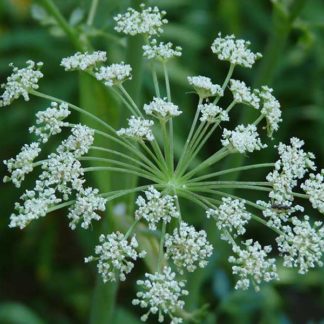
Cicuta douglasii / water hemlock
- HIGHLY TOXIC
- primarily on continuously wet soils, e.g. ditches, stream banks, pond margins, marshes.
- white compound umbel inflorescence typical of the Apiaceae/Umbelliferae
- multiply compound leaves with prominent veins ending in notches between lobes
-
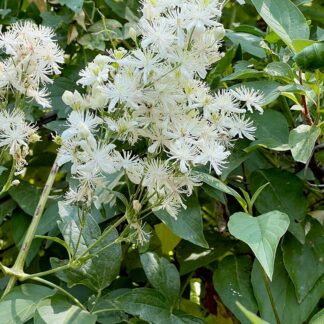
Clematis ligusticifolia / western white clematis
- climbing vine... makes dense canopy
- in canyons and streamside thickets
- compound leaves with 5-15 leaflets, often widely spaced
- white flowers with 4 "petals", many pistils and stamens — late summer
- fruit is fluffy white cluster in Sept/Oct
-
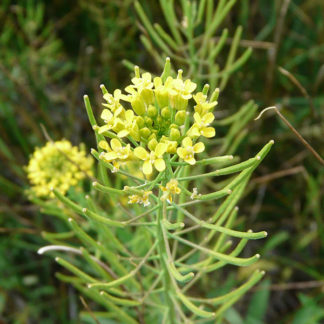
Erysimum cheiranthoides / wormseed wallflower
- yellow, 4-petaled flower, less than 1/3 inch across
- lance shaped or elliptical, sessile leaves varying little in size or shape
- leaf margins entire or coarsely toothed
- ribbed stems
- ascending or erect siliques with short pedicels
- disturbed and waste areas
-
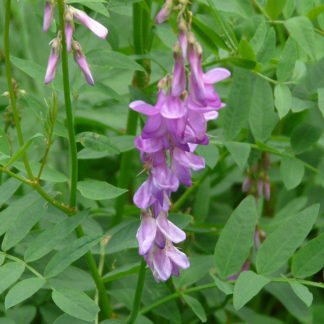
Hedysarum occidentale / western sweetvetch
- tall legume with hot pink flowers
- inflorescence several inches long; up to 80 flowers
- pinnately compound leaves with 9-21, inch-long leaflets
- higher elevations on drier, more rocky soils
-

Hesperis matronalis / dame’s rocket
- biennial, 3+ feet tall in second year
- 4-petaled flowers, especially purple or lavender
- large inflorescences with many flowers
- garden escapee
- roadsides, waste places
-
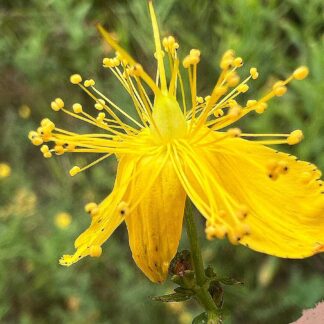
Hypericum perforatum / St. John’s wort
- bright yellow, 5-petaled flowers
- many stamens sticking out every which way
- sizable black and/or white glands on leaves and petals
- waist high and grows in large colonies (invasive)
- not (yet) seen west of the Tetons
Showing 1–12 of 23 results